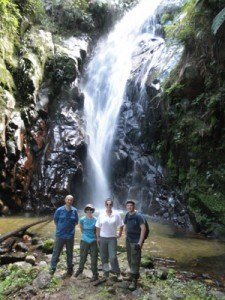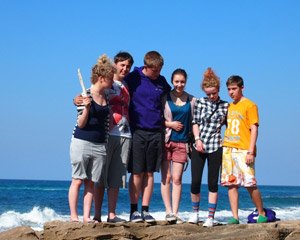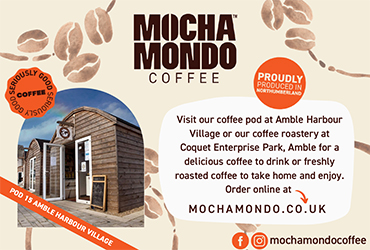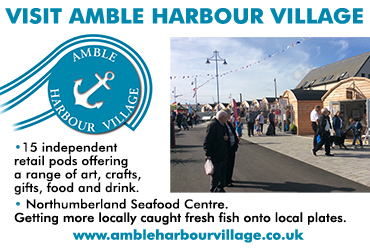Pupils and staff of JCSC travel the world
Working in Honduras
 From riding through dense jungle in the back of a pickup, high above the clouds, to walking along the bottom of the Caribbean ocean through shoals of fish; our recent trip to Honduras was nothing short of spectacular.
From riding through dense jungle in the back of a pickup, high above the clouds, to walking along the bottom of the Caribbean ocean through shoals of fish; our recent trip to Honduras was nothing short of spectacular.
The main purpose of our trip was to work as research assistants collecting carbon survey data to be included in a REDD (reducing emissions from deforestation and forest degradation) proposal. This was data used to calculate the amounts of carbon stored in the Cusuco National Park where we were working. Large, multi-national organisations like Shell are able to buy shares in the scheme as part of their carbon-offset programme. The money is used to protect the habitat of the park for the many endemic species that live there.
During the second part of the trip we travelled to a marine research station on the Honduran island of Utila. Here we qualified as open water divers and undertook marine research surveys into coral structures and aquatic biodiversity.
Nothing quite prepares you for looking out over the misty jungle treetops in the morning or walking through the dense undergrowth in the black of night, in search of spiders and snakes that could kill you with one bite. But one thing is for sure; our time spent living in our remote jungle camp was both fascinating and eye opening.
Wandering around lost ancient temples seems so far away now and despite all the hard work, the endless fundraising, the exhaustion of twenty-four hour journeys and trekking for eight hours in heat and humidity, looking back, it only seems wonderful. Kate and I would like to extend our greatest thanks to Jackie Reeves and Alex Jenkins from James Calvert Spence College, the Coquet Youth Team and all our friends and family for their support, without which, our trip would not have been possible.
Jeff Handyside (Yr 13 Leaver)
 Some have just returned from a trip of a lifetime to South Africa during the summer holidays.
Some have just returned from a trip of a lifetime to South Africa during the summer holidays.
The visit began in Johannesburg with a guided tour of Soweto township, seeing Nelson Mandela’s home and the Hector Pieterson museum built in memory of students who died in the uprising against apartheid.
Moving on to Durban, we met our host families from Southlands Secondary School and took part in a whole range of local activities. We attended lessons with our hosts as well as a special assembly for Nelson Mandela’s birthday. We learnt how to produce Zulu beadwork and tried our hand at screen printing. We visited Indian temples and learnt how to play native musical instruments at an Indian School of Music.
Five wonderful days were spent in St. Lucia viewing the wildlife on safari and we even managed to see all of the ‘Big 5’ native animals in one day!
Back in Durban, we worked in the local primary school where we tried our hand at teaching, art and PE as well as local English games and songs: quite a challenge for some of the children who only spoke Xhosa. We met students from other local schools for a conference about issues facing young people today. It was interesting to discover that there are still so many similarities between young people of different nationalities and cultures.
A particularly moving experience was visiting an AIDS centre which helps AIDS sufferers by educating them in how to become independent and provide support for their families.
We all felt that the whole experience was amazing. We had great fun but as one of our group summed it up: ‘It has really made me realise how fortunate I am to live where I do and to have so many opportunities in life: to appreciate how well-off I am.’
This visit was the fourth in an on-going exchange programme and students from Southlands Secondary School are due to visit Northumberland next year.
Written by the students and staff












